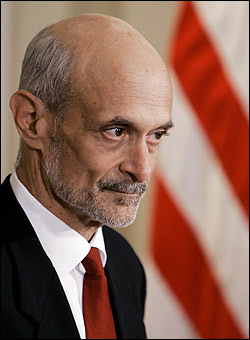Argh! The Bush administration has done it again. It has nominated to a high position yet another key player in the War on Terror whose actions are described, in a conspiracy of liberal media across the land, as “controversial.”
What, in the case of Michael Chertoff, new nominee to oversee the Homeland Security Department after the meltdown of Bernard Kerik’s nomination, does “controversial” mean?
It means that as a senior Justice Department official in the weeks after 9/11, Chertoff was responsible for the dubious practice of rounding up several hundred noncitizens on minor immigration violations and holding them in prison incommunicado for an average of three months. It meant that these people were plunged into the American gulag pending a policy, initiated by Chertoff, of “hold until clear”—meaning, basically, that the presumption of innocent-until-proven-guilty was stood on its head, and detainees were imprisoned until they were proven innocent. It means that Chertoff, as an aggressive proponent of the Patriot Act, helped set up the newly authorized surveillance networks that need not rely on a targeted individual being suspected of any crime.
“Controversial,” in the Bush lexicon, means that the person in question has done their best to shred the Constitution and its protection of civil liberties. That and unquestioned fealty to the president seem to be the two main qualifications for promotion in Bush’s second term.
Virtually every “controversial” aspect of the War on Terror now features someone who’s been promoted for misdeeds. Previous to Chertoff, the poster child for this has been Alberto Gonzales, promoted from White House counsel to the nation’s highest law enforcement post, attorney general. Gonzales is almost certain to be confirmed by the Senate despite his role in defining “torture” so narrowly, in legal terms, as to allow torture at Guantánamo, Abu Ghraib, and almost every other prison associated with military intelligence gathering around the world. At least five and up to 28 confirmed deaths of detainees are believed by the Pentagon to have been caused by aggressive policies Gonzales did not define as torture. Remember this when you hear Gonzales’, and Bush’s, ringing denunciations of torture.
The torture scandal is as good a measure as any of what happens to miscreants in the Bush administration. They keep their jobs (Donald Rumsfeld, Gen. Ricardo Sanchez, Gen. John Abizaid) or are promoted. Gonzales is one; Jay Bybee, author of a memo defining which interrogation techniques could be used, is another. Bybee, like Chertoff, received a lifetime federal judgeship for his efforts. Condoleezza Rice, War on Terror hardliner, is now secretary of state.
In Chertoff’s case, the mass roundup of Arabs, Muslims, and South Asians after 9/11 was not only a civil-liberties atrocity, it was wholly ineffective. None of the detainees was ever charged, let alone convicted, of any terrorism-related crime. Few, if any, had any useful intelligence value.
One of the reasons for Chertoff’s appointment is that he is a safe appointee, without any of the unexpected personal or professional baggage that felled Kerik. When up for his federal Court of Appeals judgeship in 2003, Chertoff was confirmed by an 88-1 vote, despite his role in post–9/11 detentions; the sole “no” came from Sen. Hillary Clinton, D-N.Y., presumably still bitter that Chertoff was a special counsel for the Senate panel investigating Whitewater in 1994. As with Gonzales, what this underscores is that few Democrats are willing to take on even the most “controversial” of Bush appointees, no matter what they’ve done, no matter how disastrous their judgment.
This has been a pattern in the Bush regime. No bad deed goes unrewarded. What is mystifying is that Democrats so often stand by idly and watch. Overshadowed by the conduct of the war in Iraq, the conduct of the rest of the War on Terror—whether the torture scandals of Guantánamo and Abu Ghraib or the excesses of the Patriot Act—scarcely figured in John Kerry’s campaign. When appointees like Gonzales and Chertoff sail through Congress, they reinforce a culture in which there is no accountability and bad news is never acknowledged. It’s one thing for Bush, who champions these policies, to promote their architects. At some point, somebody has got to oppose them.







